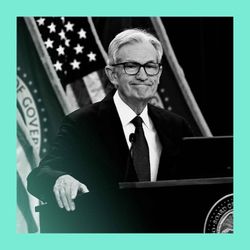Share

Money Talks from The Economist
Money Talks: The new power in the North Sea
For decades, the North Sea’s fierce gales have created a challenge for those extracting the oil and gas buried beneath its swells. But the region’s poor weather is also the key to its future: offshore wind. And the plans are surprisingly ambitious.
On this week’s podcast, hosts Tom Lee-Devlin, Alice Fulwood and Mike Bird ask whether the North Sea can turn green. The Economist’s Matthieu Favas says wind farms in the North Sea could power Europe’s 200m homes. Jesper Frost Rasmussen, mayor of Esbjerg, explains how the offshore wind industry has changed life in the Danish port town. Ulrik Stridbæk of Orsted, the world’s largest offshore wind developer, says that some sites are already generating the same amount of power as a large nuclear power station. Plus, we speak to Thomas Dalsgaard about why his firm, Copenhagen Infrastructure Partners, wants to build a physical island 100 kilometres off the coast of Denmark.
Sign up for our new weekly newsletter dissecting the big themes in markets, business and the economy at www.economist.com/moneytalks
For full access to print, digital and audio editions, subscribe to The Economist at www.economist.com/podcastoffer
More episodes
View all episodes

Trailer: Money Talks
00:52|Join The Economist’s Mike Bird, Alice Fulwood and Ethan Wu for award-winning reporting and discussion on the stories that move markets. They speak to top bosses, investors and analysts around the world for unmatched insight into global finance, business and economics. Published every Thursday.Listen to what matters most, from global politics and business to science and technology—subscribe to Economist Podcasts+.For more information about how to access Economist Podcasts+, please visit our FAQs page or watch our video explaining how to link your account.
Can America break China’s grip on critical minerals?
31:54|China dominates the supply and processing of many critical minerals, including rare earths. Now, America is responding with initiatives such as the Project Vault stockpile and a proposed “minerals club”. Will this be enough to help it win the minerals war?Guests and hosts:Matthieu Favas, The Economist’s commodities editorMike Bird, co-host of “Money Talks”Alice Fulwood, co-host of “Money Talks”Topics covered:Critical minerals securityChina's rare-earth dominanceProject VaultTranscripts of our podcasts are available via economist.com/podcasts.Listen to what matters most, from global politics and business to science and technology—subscribe to Economist Podcasts+.For more information about how to access Economist Podcasts+, please visit our FAQs page or watch our video explaining how to link your account.
A love letter to private equity
41:18|It’s hard to think of an industry more reviled than private equity. Its detractors accuse the sector of hollowing out and eventually killing beloved businesses such as Toys “R” Us. But this week, we want to convince you that private equity is the villain the world needs.Guests and hosts:Jeffrey Hooke, author of “The Myth of Private Equity”Raghuram Rajan, professor of finance at Chicago BoothAlice Fulwood, co-host of “Money Talks”Mike Bird, co-host of “Money Talks”Ethan Wu, co-host of “Money Talks”Topics covered:Private equityVenture capitalInvestmentTranscripts of our podcasts are available via economist.com/podcasts.Listen to what matters most, from global politics and business to science and technology—subscribe to Economist Podcasts+.For more information about how to access Economist Podcasts+, please visit our FAQs page or watch our video explaining how to link your account.
An interview with a king of chipmaking
33:59|The majority of America’s ten largest companies once dealt in oil. Today, it’s chips. The supply chain for semiconductors is complex and no less fraught with geopolitical tension. And at the centre of it is Arm. This week, we speak to the chip designer’s boss Rene Haas.Guests and hosts:Rene Haas, CEO of ArmShailesh Chitnis, The Economist’s global business writerMike Bird, co-host of “Money Talks”Ethan Wu, co-host of “Money Talks”Topics covered:Chips manufacturingThe semiconductor supply chainArm Holdings plcTranscripts of our podcasts are available via economist.com/podcasts.Listen to what matters most, from global politics and business to science and technology—subscribe to Economist Podcasts+.For more information about how to access Economist Podcasts+, please visit our FAQs page or watch our video explaining how to link your account.
Japan’s election: why investors are worried
35:59|Japan’s prime minister looks set for a big victory in this week’s snap election. In a bid to address Japan’s prolonged stagnation and rising cost of living, Takaichi Sanae has promised tax cuts and high government spending. How could her plans reshape the economy—and why have they rattled global markets?Hosts: Ethan Wu, Mike Bird and Alice Fulwood. Guest: Tobias Harris, founder of Japan Foresight.Transcripts of our podcasts are available via economist.com/podcasts.Listen to what matters most, from global politics and business to science and technology—subscribe to Economist Podcasts+.For more information about how to access Economist Podcasts+, please visit our FAQs page or watch our video explaining how to link your account.
‘Sell America’: is US market supremacy under threat?
29:20|From assaults on Federal Reserve independence to his threats to seize Greenland, the first year of Donald Trump’s second stint in the White House has been head-spinning. But so far, one cohort at least appears unfazed: investors. The S&P 500 has risen 15% over the past 12 months and hit yet another all-time high on January 27th. So what, if anything, would it take for investors to “sell America”?Hosts: Mike Bird, Alice Fulwood and Ethan Wu. Guest: Marko Papic from BCA Research.Transcripts of our podcasts are available via economist.com/podcasts.Listen to what matters most, from global politics and business to science and technology—subscribe to Economist Podcasts+.For more information about how to access Economist Podcasts+, please visit our FAQs page or watch our video explaining how to link your account.
When AI gets physical: a peek inside the factories of the future
39:22|“The ChatGPT moment for robotics is here,” Nvidia boss Jensen Huang said earlier this month. And nowhere is that more obvious than on the factory floor, where machines aren’t just becoming more agile, but smarter, too. This week, Money Talks takes a trip to Germany, to tour the factories of the future.Hosts: Ethan Wu and Alice Fulwood. Guest: Anjani Trivedi, The Economist’s global business correspondent.Transcripts of our podcasts are available via economist.com/podcasts.Listen to what matters most, from global politics and business to science and technology—subscribe to Economist Podcasts+.For more information about how to access Economist Podcasts+, please visit our FAQs page or watch our video explaining how to link your account.
Powell move: how Trump’s Fed fight could backfire
32:23|Donald Trump’s administration has gone to war with the Federal Reserve. His justice department has issued subpoenas to the Fed. But chair Jerome Powell says they have nothing to do with alleged wrongdoing and everything to do with pressuring him to cut rates. Around the world, central bankers have come to Powell’s defence and, at home, even Republican lawmakers have called for the Trump administration to back down. So has Trump’s latest offensive against the Fed just backfired?Hosts: Mike Bird and Alice Fulwood. Guest: Alan Blinder, former vice chair of the Federal ReserveTranscripts of our podcasts are available via economist.com/podcasts.Listen to what matters most, from global politics and business to science and technology—subscribe to Economist Podcasts+.For more information about how to access Economist Podcasts+, please visit our FAQs page or watch our video explaining how to link your account.
Oil or nothing: will Trump’s Venezuela gamble pay off?
35:32|Donald Trump had oil on his mind when he declared America would “run” Venezuela, in the wake of an audacious US mission to capture the country’s dictator Nicolás Maduro. But while Venezuela holds the world's largest proven oil reserves, extracting a profit for US firms may be harder than President Trump thinks.Hosts: Ethan Wu and Mike Bird. Guest: Vijay Vaitheeswaran, The Economist’s global energy and climate innovation editor.Transcripts of our podcasts are available via economist.com/podcasts.Listen to what matters most, from global politics and business to science and technology—subscribe to Economist Podcasts+.For more information about how to access Economist Podcasts+, please visit our FAQs page or watch our video explaining how to link your account.